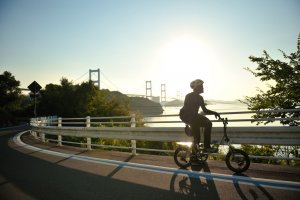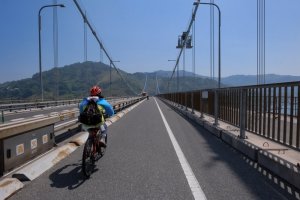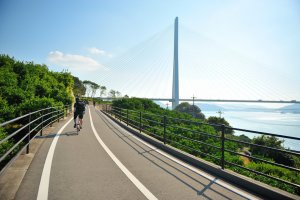Witness the grandeur of nature on the spectacular Shimanami Kaido. Known for being a popular cycling route, you’ll see some of Japan's most pristine island landscapes in the region and create opportunities for a more in-depth view of Japan and the Seto Inland Sea islands. After the Lake Biwa circuit near Kyoto, the “Kaido” is considered the second-best cycling course in Japan.
What is the Shimanami Kaido?
The Shimanami Kaido, or Nishiseto Expressway, is an expressway that spans 59.4 kilometers (36.9 miles) between Hiroshima and Ehime. Being one of three ways to cross from the main island of Japan to the smaller island of Shikoku, the expressway is popular for its 55 beautiful bridges and ease of access for cyclists and pedestrians.
The cycle route is roughly 70 kilometers long (43 miles) and only the Shin-Onomichi Bridge involves a steep climb where cyclists are encouraged instead to take a ferry. Several longer-distance options exist—up to 170 km—for long-distance cyclists who are ready to challenge the Shimanami Kaido.

Preparation
If you’re cycling, first and foremost, you’ll need a bike. There are many rental options along the Shimanami Kaido. Reservations can be made from the Hiroshima Shimanami Rental Bike Association or from the Imabari Central Cycling Terminal. A deposit and reservation are needed, so it’s encouraged to book in advance. Return methods vary by company, so be sure to check when you book.
What do I need?
Before you challenge yourself on the Shimanami Kaido, here are some of the top points to consider for cyclists of all skill levels.
- Think sporty and casual! Non-sweat absorbing fabrics are great for cycling, like polyester or mesh. Shorts, cargo pants, or leggings are appropriate bottom wear. And don’t wear sandals or shoes with long laces.
- Not all bicycles will have a basket. Be prepared to carry your supplies in a backpack. If you have too much luggage, you can always send it ahead to your accommodation via a takuhaibin service or TA-Q-BIN.
- Carry coins in case you need to make calls, use vending machines, or rent a coin locker.
- Watch the weather! In spring and fall, carry a rain poncho. In summer sunglasses and sunscreen may be necessary.
- During winter it can get quite chilly, with strong crosswinds on the bridges, so dress in full-body coverings and a windbreaker of some type.

Shimanami Kaido tips
Now that you’re ready to start cycling the Shimanami Kaido, it’s good to keep in mind these helpful tips to keep you on track or make your trip even more enjoyable.
Accommodation tips
- Stay at some of the camping grounds along the route to maximize your bond with nature.
- Also available as accommodation are family-operated bed-and-breakfast lodges (minshuku).
- Find easy access to hotels, trains, and ferries that allow you to lodge your bicycle.
Route tips
-
Follow the blue line! Once you leave JR Onomichi Station, all you need to do is follow the painted blue line to stay on track. This blue line leads all the way to JR Imabari Station and ensures the safety of cyclists. If you stray from the blue line, Google Maps can quickly get you out of trouble but do realize that alternative routes will probably include some seriously challenging hills—a dominant feature of these islands.
Cycling tips
- Look for large blue-and-white cycle signs at shops to find those that carry bike pumps and offer travelers water and rest facilities such as toilets.
- Ride on the left side of the road.
- Ride single file.
- Riding with an open umbrella is prohibited and may incur a fine.
- Be sure to stop for the night before dark hits.
- Wear a helmet!

How long will it take to travel the Shimanami Kaido?
By bike
If you stick to the blue line course, it will only take 4 to 6 hours by bicycle to finish the Shimanami Kaido. If you’re planning on stopping here and there for sightseeing be sure to allow that extra time.
You can reserve a bicycle for 1,100 yen and pay 2,000 to 7,000 yen a day (depending on the kind of bicycle) to rent a cycle for your trip. Once you return the bike at one of the rental company’s terminals, you’ll receive your deposit back. Reservations can be made from the Hiroshima Shimanami Rental Bike Association or from the Imabari Central Cycling Terminal. A deposit and reservation are needed, so it’s encouraged to book in advance.
After you’re done riding, depending on where you rented the bicycle, you may need to return it to the same location as pickup, while other renters may have a drop-off arrangement and move the bikes back to the origin by truck. So do check the terms of your rental bike before committing to payment.
By vehicle
The Shimanami Kaido can be driven in one to two hours. The one-way expressway fare costs roughly 5,000 yen. There are also direct buses from Imabari to Hiroshima, and Onomichi to Fukuyama.
By foot
Expect to spend at least 3 days walking. While there are dedicated lanes for pedestrians on some of the Shimanami Kaido, you may have to share the trail with cyclists and be expected to move aside for them to pass. It is, at its heart, a cycling path.

The Shimanami Kaido route and sightseeing spots
While traveling the Shimanami Kaido, you’ll pass through eight cities each with some great sightseeing options. From the most common starting point in Hiroshima Prefecture to Ehime Prefecture, here are the cities you’ll see.
1. Onomichi City, Hiroshima
2. Mukaishima, Hiroshima
- Senkoji Park and ropeway
- Mount Takami
3. Innoshima, Hiroshima
- Innoshima Suigun Castle
- 500 Buddha’s disciples on Mt. Shirataki
- Oyama Shrine
4. Ikuchijima, Hiroshima
5. Omishima, Ehime
6. Hakatajima
7. Oshima
8. Imabari City, Ehime
- Towel Museum
- Nomauma Highland
- Imabari Castle























